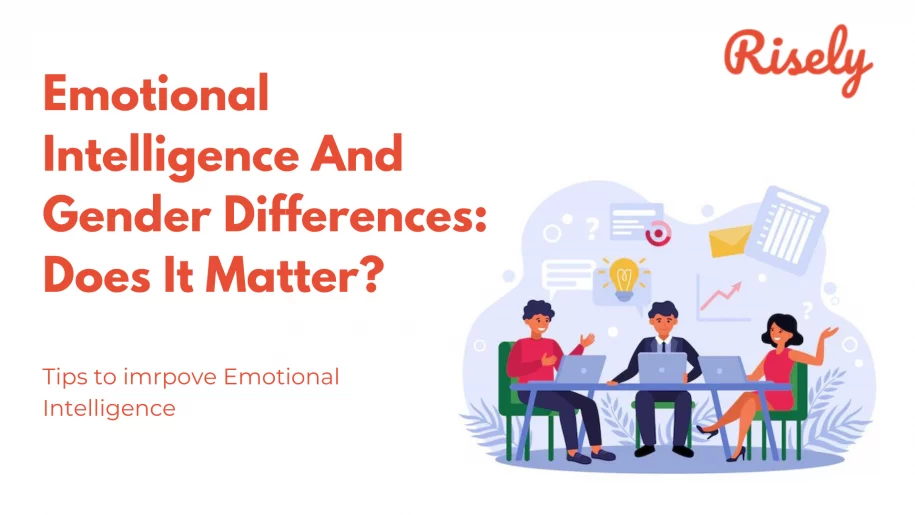Emotional Intelligence And Gender Differences: Does It Matter?
Are you a manager? And if you are, do you think one of the genders is more emotionally intelligent? This blog will explore the topic of emotional intelligence in great detail and make a case for why it matters. Finally, we’ll see whether male or female managers are more emotionally intelligent. So if you want to understand emotional intelligence better or know who is better at managing emotions, this blog is for you! There is no doubt that emotional intelligence (EI) is essential for both men and women in the workplace. Both men and women need to be able to control their emotions and understand those of others to be successful leaders. Recent studies have shown that strong emotional intelligence can impact career success. Interestingly, there appear to be some gender-based differences regarding EI.What is emotional intelligence?
Simply put, emotional intelligence is the ability to use your emotions constructively. It is the notion of controlling and utilizing your emotions instead of letting them run you. As an emotionally intelligent person, you can see, acknowledge, understand, and use your own and others’ emotions to guide thinking and activity. It may come as no surprise that workplace emotional competence is highly coveted. Individuals with high EI are better problem-solvers and have greater resilience when dealing with stressors or setbacks. They are also better at positively managing their thoughts, feelings, and actions. This makes them better leaders who can build strong teams by being sensitive to the needs of others. In addition, individuals with high EI are better at predicting and managing customer behavior as well! The emotional intelligence of a leader is of great consequence for any organization. There are many theories of emotional intelligence, each with its strengths and weaknesses. The most well-known theory of EI is the five-factor model, developed by Daniel Goleman. He is also the author of the popular book Emotional Intelligence, which significantly contributed to this term’s popularity. The model consists of self-regulation, self-awareness, empathy, interpersonal skills, and motivation. Each factor plays a role in regulating one’s emotions and social interactions.Why is emotional intelligence critical in the workplace?
Emotional intelligence is understandably indispensable in everyday interactions, and emotional intelligence is also beneficial in the workplace. Essentially, your Emotional Intelligence is a determinant of your soft skills. Studies like those of Daniel Goleman have shown correlations between emotional intelligence and productivity-enhancing factors such as – leadership skills, job performance, and mental health. Individuals with high EI are often better problem-solvers and enjoy superior teamwork skills. There’s no doubt that emotional intelligence is vital for leaders as well. It allows them to understand and manage emotions, better empathize with others, and create effective relationships. And managing emotions is one of a leader’s most important skills! The work of an emotionally intelligent manager begins by acknowledging the existence of varied emotions in every individual present in the workplace. It requires one to work on the awareness of the self, others around us, and the environment in which they work. EI is also vital to multiple managerial functions. Conflict management is one such activity where a manager must take utmost care to consider the perspectives of all sides involved. In general, too, EI will help you to understand your team members better. More emotionally intelligent leaders are also more likely to be successful. So, if you want to be a successful leader, develop your emotional intelligence skills. As a result, organizations with a population of emotionally intelligent leaders tend to be more successful than organizations without them.Who is better at emotional intelligence? Female managers or male managers?
There’s no doubt that emotional intelligence is vital for leaders. It allows them to understand and manage emotions, better empathize with others, and create effective relationships. The debate on whether men or women turn out to be better leaders is age-old and inconclusive. Numerous studies have shown differences in management styles between the sexes. Similarly, there are differences in self-perception and public perception too. The general assumption goes that women are more emotionally intelligent. This is because women are perceived as the more emotional ones. Women are seen expressing emotions with a higher frequency and tenacity. However, being emotional is not the same as being emotionally intelligent.Other Interesting Reads
Subtle differences exist in the competencies of men and women
Even though both genders score equally well, particular competencies within emotional intelligence vary for men and women. While women tend to be better in empathy, interpersonal relationships, and social responsibility, men fare better in assertiveness and self-confidence. Due to this reason, while men are considered better leaders, women are considered more emotionally proficient. Therefore, men are considered for senior leadership roles. While women, on the other hand, are apparently suitable for roles that require a caring and nurturing hand. Gender stereotypes perpetuate these beliefs. The differences exist due to a couple of reasons. Firstly, the brains of men and women work differently. These differences in designs and processes cause men and women to behave differently to the same stimuli. Secondly, the process of socialization since childhood makes a significant impact. Probably more so than biology itself. This happens through parenting, peer group, social norms, media, etc. Since childhood, males become more assertive and confident in themselves. Therefore, they grow up having significant regard for themselves. Finally, when we look at managerial and leadership roles, we understand that the qualities held by both men and women are vital. Depending upon the situation, either can be a great success or a disaster. The natural inclination of women towards empathy helps them guide new teammates better and cultivate a healthy environment. Men might be able to motivate a team better through their natural tilt towards self-confidence and enthusiasm. However, you can put not all men and women into clearly defined categories with designated qualities they will excel at. Individuals fall distinctly apart from generalizations made upon huge numbers too.Emotional intelligence for leaders
Leadership is not easy; it’s one of the most challenging jobs in the world. To be a successful leader, you must have strong communication and relationship skills. However, striving for balance in all aspects of your life is essential. This means that you need to identify your strengths and capitalize on them. One of the best ways to do this is using emotional intelligence techniques. There is no right or wrong answer regarding who is more emotionally intelligent, as both male and female leaders can be successful in this area. To do this, you should utilize your strengths and learn from others to improve your weak areas. The key is to stay true to yourself and allow others the same opportunity to do the same. Meanwhile, you can definitely take help to improve your EI.How can you improve emotional intelligence?
While beginning the journey of improving your EQ, keep in mind the five EQ components highlighted above. Working on those five areas will be the key to your success.- Observe your behavior and find situations that need improvement. Further, you can attempt to be more kind in your tone and choice of words.
- Indulge in honest self-introspection. Understand your reactions to different situations, whether joyful or stressful.
- Try to understand the impact of your actions on others. Evaluate your environment and try to be sensitive to others.
- Take charge of emotions, do not let emotions become your leaders.
- And lastly, you can look for resources that act as a guide to enhancing your EQ. It can be in the form of informative online content, books, podcasts, or fun videos that help you understand how emotional intelligence works.
Conclusion
In today’s world, it is increasingly important to have emotional intelligence if you want to be successful. Both male and female leaders need to be emotionally intelligent to lead teams and interactions effectively. However, it is generally assumed that women are better at emotional intelligence than men. Yet, we have seen that such beliefs are primarily false and a product of long-held stereotypes. EI can become the strength of any individual irrespective of their gender. And as managers and leaders, it is vital to be on a journey of continuous learning and improvement. All in all, emotional intelligence is the key to success in any field. Moreover, emotional intelligence benefits leaders and managers and can be used in any relationship. If you want to be successful, ensure your emotional skills are on point!Get a free toolkit to build a growth mindset in your team.
The free growth mindset toolkit provides extensive guidance to managers to develop a growth mindset for facing challenges smartly.
FAQs
How do you show emotional intelligence at work?
Some signs of emotional intelligence at work are mature reactions, not acting on impulses, and making objective judgment of situations.
What skills show emotional intelligence?
The most important sign of emotional intelligence at work is self-awareness. Self-awareness helps managers assess their own and other’s emotions better through difficult situations.
How to grow emotionally?
Emotional growth comes from having an open mindset and a learning attitude. It includes setting and respecting healthy boundaries and taking the time to process emotions.
Other Related Blogs
Handling Emotions at Work Effectively | Reiner Lomb
Handling Emotions at Work Effectively | Reiner Lomb Emotions are what make us human. But that’s also the part we try hard to hide in workplaces. Yet, healthy workplaces do…
Ennui: 7 out of 10 people on your team are bored
Ennui: 7 out of 10 people on your team are bored Over the past weekend, Inside Out 2 became the fastest animated film to cross the $1 billion mark. That’s…
Emotional Intelligence In Communication: 5 Ways Smart Leaders Act
Emotional Intelligence In Communication: 5 Elements Smart Leaders Use Effective communication is the cornerstone of a thriving workplace. It doesn’t matter if you’re speaking to your team members, clients, or…
IQ Vs EQ In The Workplace: How To Use Both Together
IQ Vs EQ In The Workplace: How To Use Both Together? When it comes to being an effective manager, what takes the lead – your head or your heart? For…


